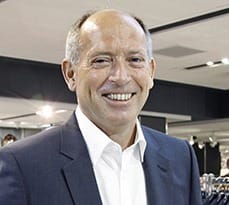We asked Sir Ian Cheshire, former CEO of Kingfisher and now chairman of Debenhams, about teambuilding, the importance of seeing the big picture, and his time as a student at the University of Cambridge.


(photo credit: Tom Stockill)
Stepping back to understand the conceptual business model is really important. A lot of people get straight into the daily activities of a business, because once they’re engaged it’s always very busy, when actually there’s a real benefit in first being able to stand back and understand what a business model is and isn’t.
Leading teams in business is the greatest privilege. I don’t believe in the CEO saviour sort of thing.
There are three levels of challenge in leading a team. First, it’s important to spend the time to pick the right team and a diverse team in order to provide proper thinking for the business. The second level is making sure you spend enough time to get the team to really understand each other. There’s a temptation to just say, “We have the org’ chart, let’s just get on with it”, but teams are particularly prone to not understand each other. You may have the action-oriented table thumper and the more creative person, and the business may need both types of people, but they need to understand each other. The final level is getting the balance right between framing and directing, providing some framework to get the right shape and energy without micro-managing. Sometimes people revert to what got them there, and they go from buying director to CEO and then act like they’re buying director again.
It’s very hard to get around the fact that the more experience you have managing teams the better. Managing is an area where practice does make a difference, because a lot is learned by doing rather than through models. So I would advise many young people starting out to take a smaller role that provides a team to manage rather than a more highly paid technical role.
One sign of a healthy organisation is that there should be lots of constructive challenge. There should be challenge in service of the common good, to make the organisation better, rather than to show off personal knowledge or ambition. There also should be evidence-based reasons for a challenge: it shouldn’t be “I don’t know anything about this, but” or “I just have a feeling about this” – but rather it should be “I’ve seen X and believe therefore Y, and it will make the business better.”
The business model for retail has been completely changed by the Internet, and particularly mobile Internet. The core point of retail remains getting it right for customers, but the Internet has had two effects: cost pressures due to the efficiency of players like Amazon squeezing the margins for retailers, and an explosion of choice. It used to be that retailers put a bunch of stock in a physical place where a lot of people are, so this was a push-based model. Now, it’s a demand-based model where the customer is completely in control. Those who have distinctive products and services will do well and can now attract a global audience, but if you’re just distributing products the Internet will take that business away because they can do it more efficiently.
Ask yourself on a weekly basis whether you have work-family balance right. I don’t think many people finish their career and think: “I wished I’d spent more time in the office.” Generally we tend to think that people can’t cope without us at work, but actually we’re more dispensable than we think. People often make the mistake to think the place will collapse if we’re not there at eleven o’clock at night, and actually from a health and well-being point of view we can’t do that for a long period of time because we get caught out.
When I studied in Cambridge I met an astonishing array of wonderful people, many of whom are still very good friends years after the event. I had a real sense of being stretched and challenged intellectually, and it was a huge privilege to be in such a beautiful place. I come back once a year or so just to check in.

